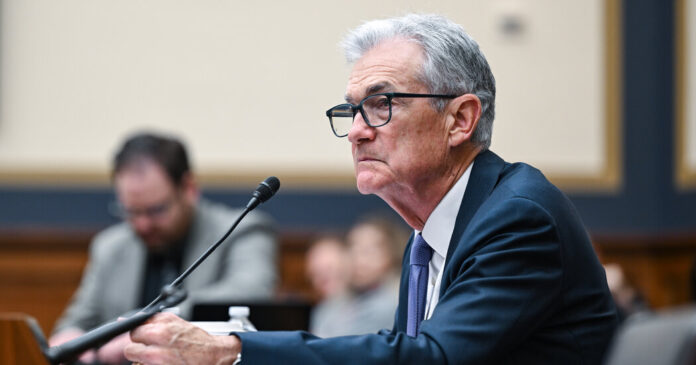Federal Reserve Chairman Jerome H. Powell indicated on Tuesday that recent inflation data had strengthened the central bank's confidence that price increases would return to normal, and further progress in that direction would pave the way for the central bank to cut interest rates.
“The committee has stated that we do not believe it is appropriate to lower the target range for the federal funds rate until we have greater confidence that inflation is moving sustainably toward 2 percent,” Powell said.
He added that the data earlier this year were not enough to inspire such confidence, but that recent inflation figures had “shown some modest further progress and further good data would strengthen our confidence that inflation is moving sustainably towards 2 percent.”
Powell made the remarks Tuesday during an appearance before the Senate Banking Committee. While Powell avoided pinpointing a specific month when the Fed might begin cutting rates, he also did little to dispel growing expectations that a cut could come in September. Fed officials meet in late July, but few economists expect a move so early.
The chairman's testimony before Congress came at a sensitive time for the central bank. Fed officials are trying to figure out when to start cutting interest rates, which they have held at decades' highest for about a year. But in weighing that option, they must strike a careful balance: They want to keep borrowing costs high long enough to cool the economy and stop rampant inflation entirely, but they also want to avoid excesses that could cause the economy to collapse too much and trigger a recession.
“If we ease policy too late or too little, we could harm economic activity,” Powell said. “If we ease policy too much or too early, we could undermine progress on inflation. So we are weighing those two risks very carefully, and that's really at the heart of what we're thinking about right now.”
While Fed officials focused on containing inflation in 2022 and much of 2023—even at economic cost—price increases have cooled to the point where they are now clearly considering the trade-offs between cooling inflation and weakening the labor market.
After jumping to 9.1 percent in 2022, consumer price index inflation is expected to fall to 3.1 percent from the June reading scheduled for this Thursday. Importantly, prices are currently rising very slowly on a monthly basis, a sign that inflation is coming back under control.
“After failing to make progress toward our 2 percent inflation goal earlier this year, recent monthly readings show modest further progress,” Powell said.
The decline in inflation is partly due to supply chains recovering from pandemic-related disruptions, leading to falling commodity prices, but the progress is also thanks to a continued slowdown in the overall economy.
This slowdown in economic growth is due to Fed policy. Starting in March 2022, central bankers quickly raised interest rates to the current 5.3 percent before leaving them at this high level. This made loans to expand a business, buy a car or buy a house more expensive – which dampened economic demand.
The labor market is also weakening after years of surprising strength. Job openings are gradually declining after the sharp rise following lockdowns during the pandemic, and the unemployment rate is steadily rising. Wage growth is also slowing, a sign that employers are no longer paying as much as they compete for new employees.
“In the labor market, a wide range of indicators suggest that conditions are roughly back to where they were on the eve of the pandemic: strong but not overheated,” Powell said.
Overall, Powell's comments painted a picture of an economy that is gradually moving toward the Fed's goals, potentially enabling the gentle downturn that policymakers had hoped for. Although it is rare for the Fed to contain serious inflation without triggering a recession, policymakers are optimistic that they could succeed this time.
Powell also answered questions about a major Fed proposal on banking regulation, dubbed “Basel III Endgame,” that has stoked discord among regulators and drawn protests from banks and their lobbyists. Fed officials have made clear they plan major changes to the proposal, and banking groups want regulators to re-propose it entirely.
“The board members strongly believe that we need to put a revised proposal out for comment for some period of time,” Powell said, later suggesting that the new comment period could be about 60 days.
“We are working through this issue with other regulators,” he said. “We are ready to move forward if we can reach agreement on this.”
He also faced questions about the housing market, which is struggling with a lack of supply. Some lawmakers have blamed the Fed: Because mortgage rates have risen so much with higher Fed rates, many people are avoiding moving and opting to stay home and hold on to their low fixed rates. Home construction has also slowed.
“The best thing we can do for housing supply is to get inflation under control so that interest rates can come back down,” Powell said. “The policy to increase housing supply is not so much in the hands of the Fed, but in the hands of legislatures at the state and federal levels.”
Mr Powell will testify before the House Financial Services Committee on Wednesday.














